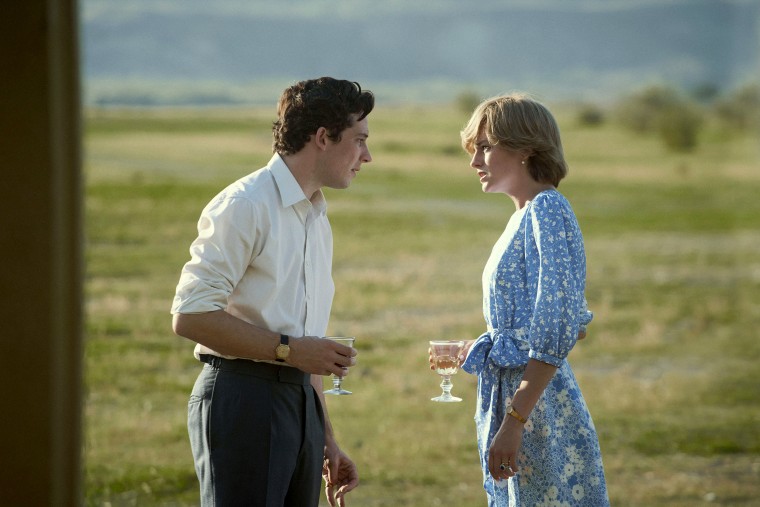It took five years and four seasons, but Netflix's "The Crown" is finally getting buzz that matches its ambitions. According to Netflix's numbers, season four is a hit on par with the streaming service's biggest series to date, "The Queen's Gambit." But when it comes to the royals, not all publicity is good publicity. Despite what has been the palace's policy to publicly ignore the series (while privately suggesting that the royals have a "good sense of humor" about it), the latest season has ruffled feathers. British Culture Secretary Oliver Dowden went so far so to urge Netflix to add a disclaimer of sorts labeling "The Crown" as fiction and not historically accurate.
If this institution is really so fragile that 10 episodes of a costume drama can topple it, the royals clearly have bigger problems.
Netflix has, naturally, refused. Not only is such a thing unnecessary — the show is clearly labeled "drama" — but bowing to such a request would set a troubling precedent for how much one country's internal politics can interfere with Netflix's global programming decisions. The British monarchy has stood (albeit with a few brief interludes) for centuries. If this institution is really so fragile that 10 episodes of a costume drama can topple it, the royals clearly have bigger problems.
No one demands that Shakespeare come with the warning that Marc Antony never said "Friends, Romans, countrymen, lend me your ears." And "The Crown" has always stated that it is a historical drama, a series that ambitiously looks at the near history of the United Kingdom and its current ruler and uses it to tell the story of a family warped by duty over all else. It is no more a documentary than, say, "The Spanish Princess" (which recently wrapped its second season on STARZ). "The Spanish Prince" uses the real Catherine of Aragon to tell the fictionalized tale of an ambitious woman who found herself trapped by patriarchy and religion. Of course, many of the characters in "The Crown" are still living, and a great amount of detail has been devoted to making the drama look like real life. But that does not a documentary make.
The request from the culture minister — which apparently prompted a private meeting between Netflix and Dowden — is all the odder because "The Crown" is such an established series at this point.
Writer Peter Morgan came into the project with obvious royalist leanings; his career highlights consist mainly of films and Broadway shows in which Elizabeth II is painted in a favorable light. But even so, the show's first three seasons were not always flattering to the royal family. The palace is depicted as out of touch and stiff-necked in season one when it refuses Princess Margaret's request to marry a divorced man, for example. Season two's finale features scenes suggesting not only that Prince Philip was unfaithful to Elizabeth, perhaps with multiple women, but also that he may have been tangentially involved with someone's suicide. (This is not based in fact.) Elizabeth herself is shown at times to be more interested in maintaining the monarchy than the feelings of her own children, especially in season three. And yet, no one felt the need to demand warning labels last year.
The royal family has worked hard for the past two decades to rehabilitate Charles’ image.
The difference, of course, is that even when bad choices are made, the show tried to keep the audience on the side of the ruler and her heir. The queen may have blocked Margaret's first proposed marriage, but she feels heartsick about it. Philip's "cheating" naturally draws the viewer's sympathy toward the queen. Even the scenes in which Elizabeth could come across as insensitive to her son Charles are ultimately painted more as a series of hard lessons that the future king of England needs to learn.
Season four of "The Crown" still attempts to show Elizabeth and Charles in somewhat positive manners. But it runs up against a far more natural heroine with the introduction of the late Princess Diana. Though she and Charles divorced nearly 25 years ago, their marriage (and its end) still remains a cultural flashpoint. And many, if not most, viewers remember scenes like Diana and Charles' engagement announcement, their Australian trip (real news footage of which can be found on YouTube) and her surprise performance with the Royal Ballet for Charles' birthday (which was written about during the 20th anniversary of her death in 2017). The costumes and camera angles from these real events are re-created meticulously by the showrunners, though the dialogue is, naturally, fictionalized.
One can understand why reviving these real-life events would make the palace nervous. After all, the royal family has worked hard for the past two decades to rehabilitate Charles' image (along with that of Camilla, his queen consort-to-be) in the wake of his divorce and Diana's passing. But this foolish decision by the cultural authorities is likely to have the opposite effect. Ironically, one of the running themes of "The Crown" is that saying nothing is always the smarter choice, because to acknowledge something draws people in. Not everyone has learned this lesson.
Until now, royal surrogates have been quick to deny having anything to do with "The Crown." With two more seasons, which will focus on Charles and Diana's divorce and the aftermath of her death, this should continue to be the policy. If anything, the U.K. government's attempt to pressure Netflix suggests that the show hit a nerve. Perhaps "The Crown" is more emotionally correct in its dramatization than some might like to admit.


